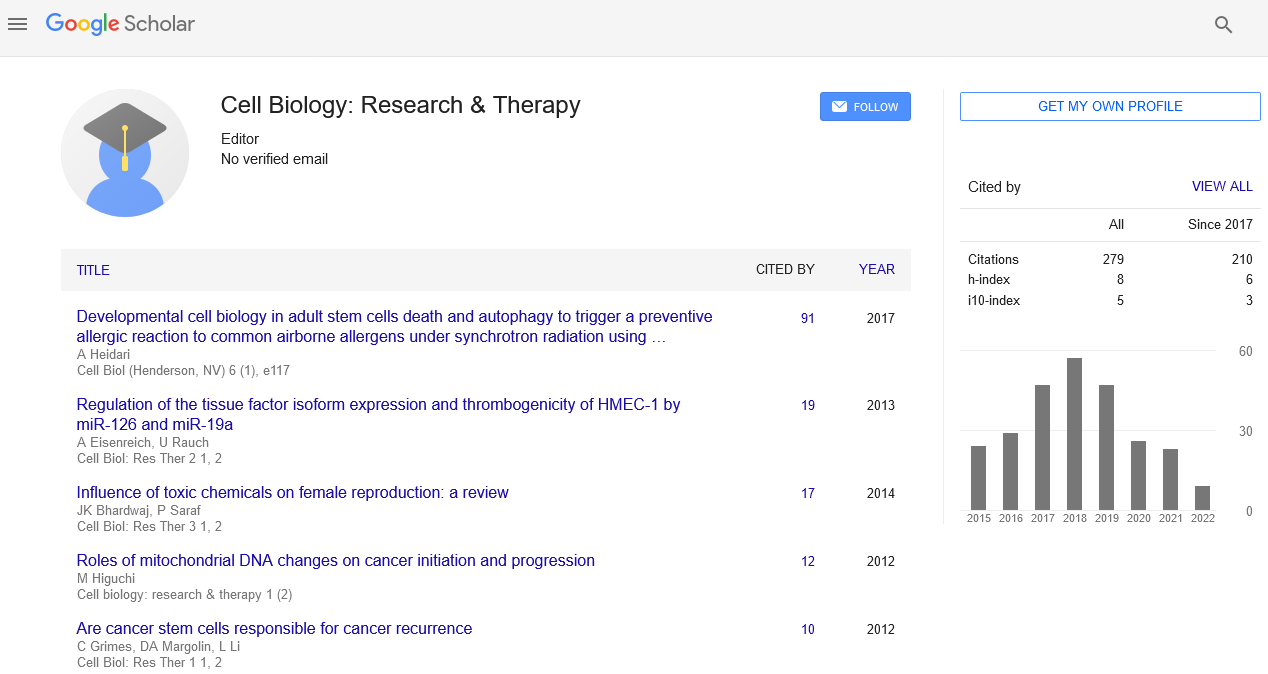Opinion Article, Cell Biol Vol: 12 Issue: 1
Cell Transplantation for Cardiac Repair: Recent Developments and Future Directions
Effie Liu*
1Department of Marrow Transplantation, Aichi Medical University, Nagakute, Japan
*Corresponding Author: Effie Liu
Department of Marrow Transplantation, Aichi
Medical University, Nagakute, Japan
E-mail: liueffie6281@gmail.com
Received date: 21 February, 2023, Manuscript No. CBRT-23-93173;
Editor assigned date: 23 February, 2023, Pre QC No. CBRT-23-93173(PQ);
Reviewed date: 07 March, 2023, QC No. CBRT-23-93173;
Revised date: 14 March, 2023, Manuscript No. CBRT-23-93173(R);
Published date: 24 March, 2023, DOI: 10.4172/2324-9293.1000165
Citation: Liu E (2023) Cell Transplantation for Cardiac Repair: Recent Developments and Future Directions. Cell Biol 12:1.
Description
Cell transplantation has emerged as a promising therapy for cardiac repair. Over the past few years, there have been several significant developments in this field that have enhanced our understanding of the mechanism underlying the therapeutic effects of cell transplantation and opened up new avenues for further research. Some of the recent developments in cell transplantation for cardiac repair and discuss the future directions in this area of research.
Heart disease is one of the leading causes of death worldwide, and despite advances in medical therapy, the mortality rate associated with heart failure remains high. Cell transplantation has emerged as a promising therapy for cardiac repair, and several types of cells have been investigated for their potential to repair and regenerate damaged cardiac tissue.
The aim of cell transplantation is to replace the damaged or lost cardiomyocytes and promote angiogenesis and neovascularization in the infarcted area. Stem cells, in particular, have shown great promise in cardiac repair, owing to their ability to differentiate into multiple cell types and secrete paracrine factors that promote tissue regeneration.
Recent developments
Mesenchymal Stem Cells (MSCs): Over the past few years, MSCs have been extensively studied for their potential to repair damaged cardiac tissue. MSCs are multipotent stem cells that can differentiate into various cell types, including cardiomyocytes, and secrete paracrine factors that promote tissue repair. Several preclinical studies have demonstrated that the transplantation of MSCs improves cardiac function and reduces fibrosis and apoptosis in the infarcted area.
Adipose Tissue-Derived Stem Cells (ADSCs): ADSCs are an alternative source of MSCs that can be obtained from adipose tissue. Like MSCs, ADSCs can differentiate into multiple cell types and secrete paracrine factors that promote tissue repair. Preclinical studies have shown that the transplantation of ADSCs improves cardiac function and reduces fibrosis and apoptosis in the infarcted area.
Cardiac Progenitor Cells (CPCs): CPCs are a type of stem cell that reside within the heart and have the ability to differentiate into cardiomyocytes and vascular cells. CPCs have been shown to be effective in repairing damaged cardiac tissue in animal models of Myocardial Infarction (MI). However , their therapeutic potential in humans remains to be fully explored.
Induced Pluripotent Stem Cells (iPSCs): iPSCs are a type of stem cell that generated by reprogramming somatic cells to a pluripotent state. iPSCs have the ability to differentiate into multiple cell types, including cardiomyocytes, and have been shown to be effective in repairing damaged cardiac tissue in animal models of MI. However, their use in humans is limited by the risk of teratoma formation.
Exosomes: Exosomes are small vesicles that are secreted by cells and contain a variety of biomolecules, including miRNAs, proteins, and lipids. Exosomes derived from stem cells have been shown to have therapeutic effects in animal models of MI by promoting angiogenesis and reducing apoptosis and fibrosis. The use of exosomes as a therapeutic agent for cardiac repair is a promising area of research.
Future directions
Combination therapy: Several studies have demonstrated that the combination of stem cell transplantation and other therapies, such as gene therapy or tissue engineering, can enhance the therapeutic effects of cell transplantation. Combining different cell types, such as MSCs and CPCs, may also have synergistic effects on cardiac repair.
Cell-free therapies: As an alternative to cell transplantation, cellfree therapies, such as exosomes or conditioned media, may have therapeutic effects on cardiac repair. These therapies offer several advantages over cell transplantation, such as the lack of immunogenicity and the reduced risk.
Personalized medicine: The use of patient-specific cells for cardiac repair may improve the therapeutic efficacy and reduce the risk of immune rejection. Induced Pluripotent Stem Cells (iPSCs) can be generated from a patient's own cells and differentiated into cardiomyocytes for transplantation. This approach has the potential to overcome the limitations of allogeneic stem cell transplantation, such as immune rejection and ethical concerns.
Advanced delivery systems: The efficacy of stem cell transplantation for cardiac repair is dependent on the delivery of cells to the injured heart. Advanced delivery systems, such as biomaterials or nanocarriers, can improve the targeted delivery and retention of cells in the damaged area, thereby enhancing the therapeutic effects of stem cells.
Non-invasive imaging and monitoring: Non-invasive imaging and monitoring techniques, such as Magnetic Resonance Imaging (MRI) and Positron Emission Tomography (PET), can provide realtime information on the distribution and survival of transplanted cells in the heart. These techniques can also help to optimize the timing and dosage of cell transplantation for maximal therapeutic benefit.
 Spanish
Spanish  Chinese
Chinese  Russian
Russian  German
German  French
French  Japanese
Japanese  Portuguese
Portuguese  Hindi
Hindi 